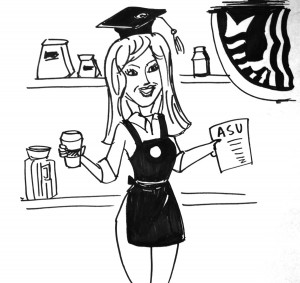Starbucks college program effective idea
In America, a good education is not easily brewed up. So when Starbucks announced Monday that it would pay for its employee’s college education, the company showed that it valued its employees’ educational aspirations by financially supporting them through the process of gaining their bachelor’s degrees. To make a more impactful statement about the role of education within the large corporation, however, Starbucks should give the employees who take advantage of this new policy the chance at more promotion options that allow them to integrate their degree and newfound skillset into the company.
As the largest coffeehouse chain in the world, Starbucks employs 151,000 full-time employees, according to 2013 statistics from Starbucks Company. Under a new deal with Arizona State University, Starbucks employees will be able to take online classes that are paid for by the company. According to The New York Times, the employee has to work at least 20 hours a week and have the grades and test scores to gain admission into the university. Once that criterion has been met and the employee has already completed two years of college, Starbucks promises to pay for full tuition for at least two years of college. If the employee is just starting his or her higher education, the company will pay part of the cost.
“In the last few years, we have seen the fracturing of the American dream,” Starbucks Chief Executive Officer Howard Schultz said in a statement.
The push to provide its employees with a college education is not new to Starbucks. This plan replaces an existing tuition program that gave workers $1,000 a year to study at City University of Seattle, located in the same city of the company’s headquarters, or Strayer University online.
The decision to make this an online degree program is spot on. According to a 2011 study by U.S. News, online enrollment for college classes is increasing. More than 6.1 million students took at least one online class during the fall of 2010, which was an approximately 10 percent increase from the previous year. Furthermore, Arizona State University has one of the largest online degree programs in the nation with a great assortment of options for classes.
Yet with any educational aspirations there has to be a plan. At most U.S. universities and colleges there is a career center where students can access and meet with counselors to discuss how his or her major and field of study will correlate to a job at the end of the day. College is about finding a career.
Therefore, as part of this wide-net plan, Starbucks must look at the full picture. Where do they want their employees to go after completing their degrees? Surely not everyone will stay. There should be the option, however, of getting promoted or more integrated into the company if the bachelor’s degree is achieved under Starbucks’ dime.
If baristas are given no plan of what to do with their degrees then they will just be more college-educated baristas with no higher career options. That doesn’t seem like a fix to the problem.
According to the Guardian, in 2013, more than a quarter of a million college graduates were working minimum wage jobs. There is nothing wrong with minimum wage jobs, but since college degrees have traditionally led to a promise of a solid job with security. a transformational educational initiative such as Starbucks’ must try to return a college degree to the same standard it once had.
Yes, an education should take one to the next level. And yes, Starbucks is sending a clear message that they value education in their workers. But if Starbucks is doling out the cash they should plan to integrate the returns of a more educated workforce back into that company. That will surely keep the company — and its employees — moving forward in the future.
Jordyn Holman is an incoming junior majoring in print and digital journalism. Her column “Making the Grade” runs Wednesdays.


